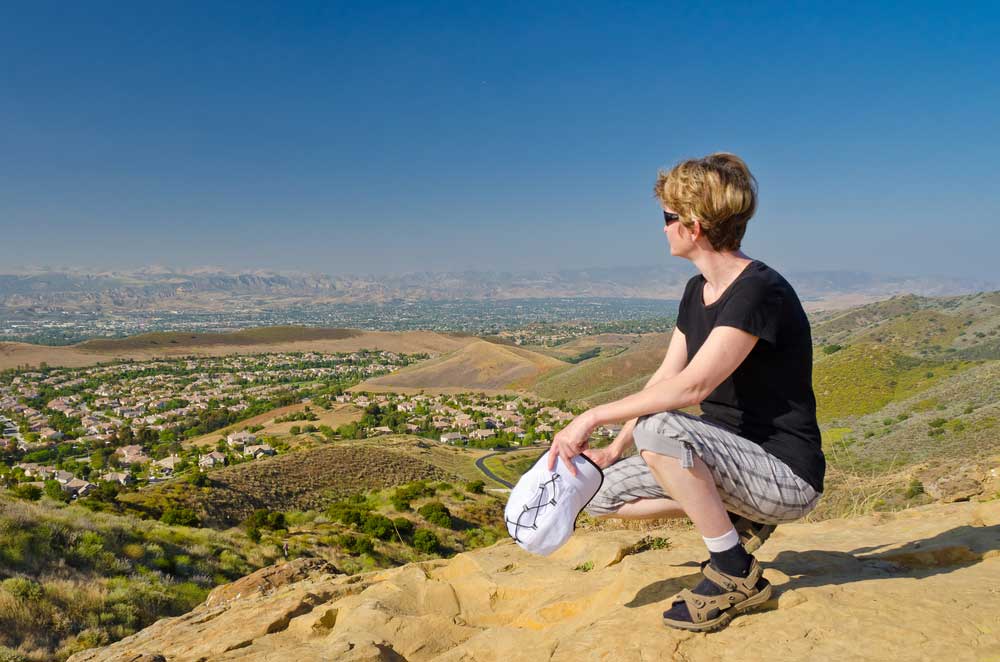Debbie’s Abdominal Hysterectomy – Vertical Incision
Type of Hysterectomy: TAH (vertical incision), both ovaries
Age at surgery: 57
Location: Simi Valley, CA
My doctor detected a large mass in my abdomen during my annual well-woman exam. She ordered a sonogram that day and a CT scan the next which confirmed a very large mass (24 cm x 18cm). The mass appeared to be primarily cystic and possibly ovarian in origin but the mass was so large that it covered both ovaries and the CT scan was unable to confirm the origin.
Prior to the diagnosis, I had no symptoms that I would have associated with this condition. Because my CA 125 levels were elevated and I had a family history of cervical cancer, ovarian cancer was strongly suspected. My GYN surgeon immediately brought a GYN oncology surgeon onboard for both a 2nd opinion and to assist in the surgery to select the sections of the cyst for biopsy during surgery and if cancer was found, to check for metastasis, biopsy the lymph nodes and stage the cancer.
Because of my family history of cancer and because I was 6 years post-menopausal, both surgeons recommended a full hysterectomy including ovaries; the size of the mass required that the surgery be abdominal with vertical incision.
My surgery experience was very positive. I was fortunate to be in the care of two very capable and compassionate surgeons. Blessedly, the mass was just a very large ovarian cyst and there was no sign of cancer. After removing the cyst, the surgeons also found endometriosis which was previously undiagnosed.
I’m not sure what anesthesia I received. I remember the anesthesiologist mentioning Propofol but he mentioned he would be using another drug with it. My anesthesiologist also gave me a spinal block before surgery to help manage the post surgical pain. This was a great idea! In fact after surgery, I was able to bend my knees, lift my bottom and slide myself off the OR table and onto the hospital bed with no pain at all! Forty years ago I had gallbladder surgery and recall a very different experience of intense pain as the OR nurses transferred me from the table to a gurney and later from the gurney to the bed in my room.
I was in the hospital 4 days. I’m told this was longer than the average stay of 3 days for abdominal hysterectomy due to involvement of bowel wrapped around the cyst and endometrial scar tissue removal from my intestines.
My recovery was fairly uneventful. I won’t sugar coat it, the first couple of weeks were very painful. In the first week in particular, I had severe gas pain in addition to the incision pain.
I was given Simethicone for gas but received no relief until my first BM five days after surgery. The incision pain was managed with Percocet and Rx strength Ibuprofen.
I haven’t had any serious complications sine the surgery, just a mild bladder infection (not uncommon after catheterization) and a a few sharp pains that are likely caused by scar tissue formation.
To ease my recovery, I was very fortunate to have a very supportive husband, a one-story house and an adjustable bed. I don’t think I could have managed stairs for the first 2-3 weeks and the adjustable bed made it much easier to get in/out of bed. My husband was wonderful, picking up the slack with household chores and cooking.
I was off work for 6 weeks. In the 7th week I worked four hours a day from home, then returned to the office full-time in week 8.
I was told not to lift more than 25 pounds for at least 6 months to reduce my risk of hernia. Apparently vertical incisions are more prone to hernia than horizontal incisions.
Two months after surgery, I still have trouble with some movements and tasks such as bending over, tying my shoes and getting into our SUV. I’m at the point in my recovery that I sometimes forget that I still need to be careful. The occasional pain reminds me that I’m still healing and need to take it easy. I also still have some belly swelling and tenderness. I’ve found that wearing elastic waist pants is much more comfortable than pants/ jeans with a fly because the fly adds several layers of fabric and the zipper right where my incision is. Elastic waist pants are not very stylish, but the comfort is worth it! 🙂
My biggest challenge has been regaining my stamina. An 8 hour work day (office job) plus a 45 minute commute each morning and evening now leaves me totally exhausted. This is made worse by lack of sleep due to hot flashes. Despite being 6 years post menopausal, removal of my ovaries triggered hot flashes again. I guess my ovaries were still producing estrogen after all those years. I can’t take hormone replacements due to family history of breast cancer so I’m toughing my way through them once again. The hot flashes are not especially bothersome during the day, but wake me up several times each night. My doctor prescribed Lunesta to improve my sleep.
Prior to surgery, I didn’t have any symptoms that I would have associated with the ovarian cyst, however conditions I was experiencing have stopped so I guess they were related. For example, I was having occasional sharp pains like a pulling sensation when emptying my bladder. The surgeon said the cyst was displacing my bladder so this was probably related. The bladder pain is now gone. I was also experiencing frequent gastric reflux when lying down and that symptom is also gone. I was unaware that I had endometriosis but it explains the reasons behind the painful periods I experienced in the past.
The biggest bonus of all…my migraines are completely GONE! My doctor says they were likely hormone triggered and since the estrogen is gone, the trigger is gone too.
My advice to others facing the surgery would be to ask questions of your doctors to ensure that you understand your diagnosis and know your options. This site has great resources to help make sense of the medical jargon, as well as real world testimonials of women who have been through it. Be informed and be prepared.
Before surgery, make preparations to ease your recuperation. Be sure you have someone to stay with you for at least a week after you come home, you’ll need help getting in/out of bed, etc. Bring a robe and slippers for the hospital stay. Give your house a good cleaning before surgery if you can because trust me, you won’t be able to do it again for a couple of months post surgery. And this sounds silly but trust me you need it – buy at least one of those extension handle grabbers because you won’t be able to pick things up off the floor.
Be sure to talk to your doctor about the hormonal effects and menopausal symptoms you may face after surgery and what treatments are appropriate for you.
Most importantly know that there is life after hysterectomy. Removal of your uterus isn’t the end…it’s often the beginning of a healthier, happier life!






